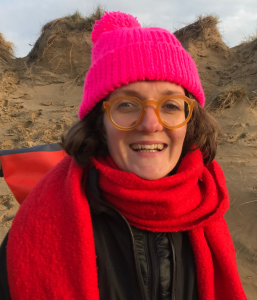
Spotlight on…
Dr Lucy McFadzean, Research Associate, University of Exeter
What’s your current role at your institution?
I am a Research Fellow at the University of Exeter on the Transforming Homes Project. My main responsibilities lie in Work Package 5: Creating Participatory Liveable Design, which means I am focussed on ensuring residents and communities are at the heart of the design process. This involves conducting in-depth interviews and creative documentation tasks with residents, collaborating on co-design workshops and ensuring that people-centred stories and experiences of home are embedded across the project.
Which past experiences have helped you the most in your current role?
My background sits loosely in the field of cultural studies and human geography, so I have a variety of experience working with people through co-design, interviews and workshops. Prior to this role I worked on a research project in collaboration with the World Cities Culture Forum looking at how cities can use culture to imagine just urban futures. It has been exciting to build on this in the Transforming Homes project, developing further research methods for imagining future streets and neighbourhoods with communities, and bringing the very tangible cultural asset of housing into the conversation.
I have also worked with the Office for Civil Society in DCMS on research into how young people can co-design policy at a national level. A key learning from this research was the need for clear and open communication on the scope and possibilities within co-design processes. I think my experiences have helped me strike the delicate balance between being clear about the immediate transformations happening within our project, and empowering people to influence change beyond what may seem immediately possible.
What excites you about the research in the Transforming Homes project?
Most of all, I’m excited about the real, tangible impacts that transforming the demonstrator homes will have on the lives of people who live there. So often in my area of research, the core outputs and outcomes are less direct and clear, and it’s been emboldening to work towards something that feels so solid. In contrast to this, the ways in which the project is thinking beyond the bounds of a traditional house-by-house retrofit in a more expansive and less quantitative way is also something that excites me. I’m really interested to see how we think about housing as more than ‘stock’ and instead as a cultural asset, through the project, and what this means for the future.
How is your expertise contributing to the Transforming Homes project?
To some extent, my lack of ‘expertise’ in retrofit and some of the more technical elements of the project has been a real benefit! It has allowed me to approach conversations from the perspective of a non-expert, raising questions and jargon-busting in a way that I hope makes the research more accessible and applicable, particularly for the residents and communities we are working closely with. One of the most inspiring elements of the Transforming Homes project is how we are working to make the transformation of homes and neighbourhoods for future generations not just the purview of experts, but something everyone in society is empowered to take part and invest in. That being said, I do hope my skills in interviewing, workshops and facilitation are contributing to the project by allowing us to gather and share the everyday expertise of people and communities in the places we are working.
